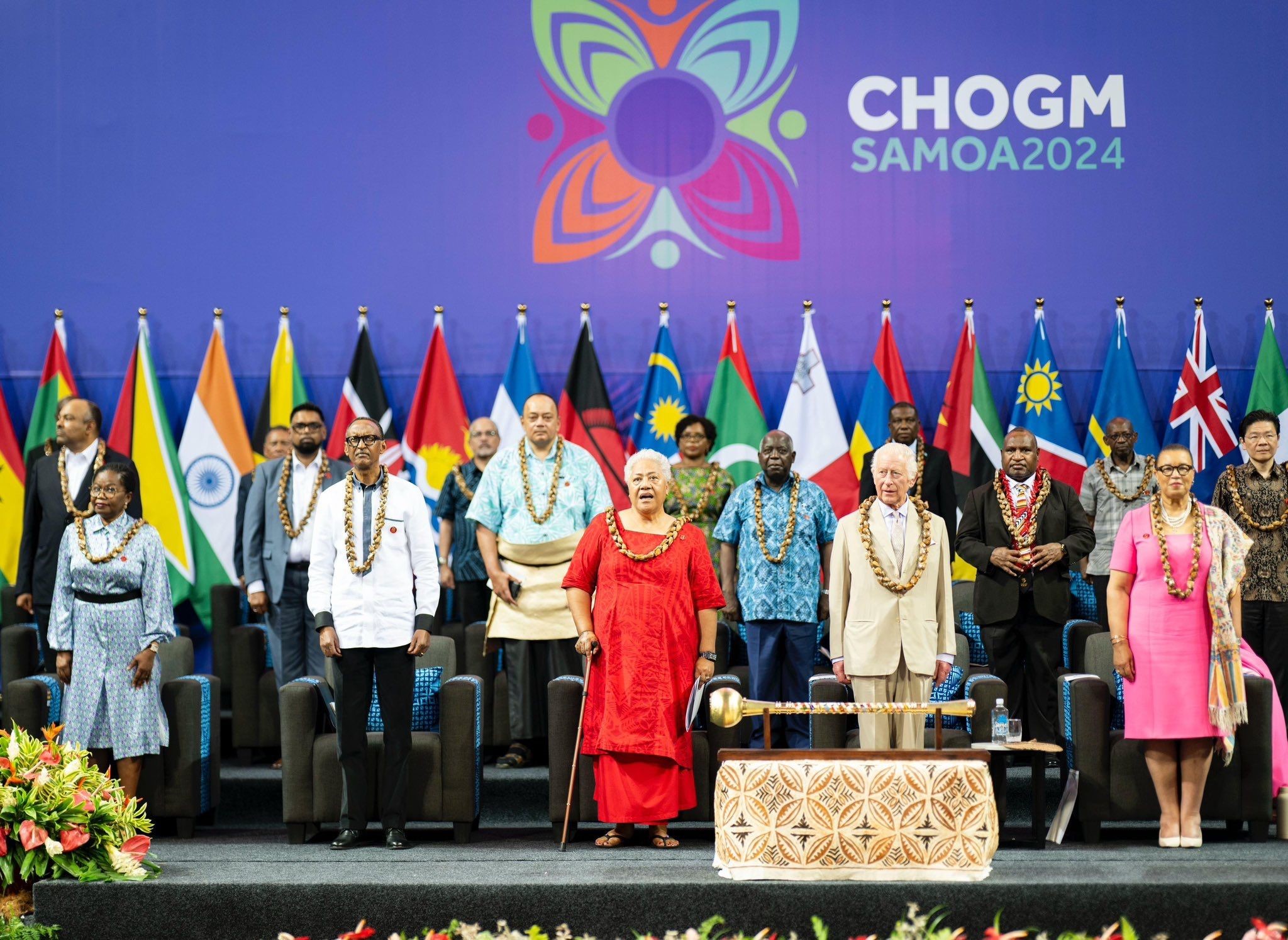-
AuthorPosts
-
-
Reparations for
Slavery and
Colonialism: A Call
for Justice from
Commonwealth
Leaders and Beyond:

Abstract:
As momentum grows for reparations for historical injustices related to slavery and colonialism, the issue has recently gained focus at the Commonwealth Heads of Government Meeting (CHOGM) held in Samoa. Leaders of the Commonwealth’s 56 member states have highlighted slavery and climate change as primary themes, stressing the need for open, truthful discussions about Britain’s historical role in the transatlantic slave trade. This paper examines the evolving stance on reparations across European countries involved in the trans-atlantic slave trade, the diverging perspectives among global leaders, and the implications of such discussions for international equity and social justice.
Introduction.
The call for reparations related to the transatlantic slave trade and colonialism has recently intensified as former colonies, particularly in the Caribbean and Africa, have urged European countries to acknowledge and address the enduring socioeconomic consequences of slavery. This issue was central at the recent Commonwealth Heads of Government Meeting (CHOGM) held in Samoa, where the leaders of 56 member nations, most with historical ties to the Britain, called for a “meaningful, truthful, and respectful conversation” about the past. Britain’s Prime Minister, Keir Starmer, emphasized that the summit was “not about money” but agreed that dialogue is necessary.
This paper explores the complex landscape of reparations, examining the positions of various former colonial powers, the arguments for and against reparations, and the historical legacy of slavery in shaping modern-day inequities. It also discusses recent developments, including the growing advocacy among Commonwealth nations, particularly Caribbean and African states, for reparations in forms such as debt cancellation, educational support, and formal apologies.
The Historical Legacy of Slavery in the Commonwealth.
The transatlantic slave trade, one of the largest forced migrations in human history, saw at least 12.5 million Africans kidnapped, transported, and enslaved by European merchants from the 15th to the 19th centuries. Britain alone trafficked an estimated 3.2 million individuals, while Portugal’s role extended to nearly 6 million, making them the two most active participants. The practice of “blackbirding”—the coercion or kidnapping of individuals from the Pacific Islands to work on plantations in places such as Australia—highlights the extent and methods of forced labor practices beyond Africa.
These historical practices have led to profound, intergenerational socioeconomic impacts in former colonies. Slavery’s legacy is visible today in systemic racial inequalities, from disparities in wealth to limited access to education and health resources. Proponents of reparations argue that financial compensation and formal apologies can serve as both a symbolic and tangible commitment to redressing these injustices.
Commonwealth Nations’ Call for Reparations.
The collective statement issued by Commonwealth leaders marks a pivotal moment in the reparations movement, signaling a unified call to address colonial and slavery-linked inequities. This joint call places moral and political pressure on Britain and other former colonial powers, urging them to reevaluate their positions on reparations.
In recent years, the Caribbean Community (CARICOM) has been particularly vocal, calling for reparative justice measures that include formal apologies, debt relief, and investments in education, health, and cultural initiatives across the Caribbean. Similarly, the African Union is developing a reparations plan focused on addressing slavery’s long-lasting impact on African nations.
However, consensus remains elusive. While many Commonwealth nations have called for reparations, the joint statement deliberately refrained from specifying the form reparations should take, reflecting the diverse perspectives within the group.
The European Perspective:
Britain:
The British government’s official stance has consistently rejected the notion of reparations, with leaders framing the conversation as historical rather than financial. Despite this, figures like King Charles III and former Prime Minister Tony Blair have publicly acknowledged Britain’s role in the transatlantic slave trade. King Charles, addressing Commonwealth leaders in 2022, expressed deep sorrow and encouraged ongoing research into the monarchy’s historical ties to slavery. While Blair issued an apology during a 2007 visit to Ghana, his statements fell short of endorsing reparative action.
Prime Minister Keir Starmer’s recent comments reflect continuity in Britain’s policy, focusing on looking forward rather than engaging in extended discussions about the financial aspect of reparations. His remarks have dampened hopes among reparations advocates that a Labour-led government might adopt a more receptive approach.
Portugal:
Portugal, second only to Britain in the scale of African trafficking, has seen evolving perspectives on its colonial legacy. President Marcelo Rebelo de Sousa recently acknowledged Portugal’s responsibility for crimes committed during its colonial past, sparking debate and calls for accountability within Portuguese society. While the president suggested a need for reparations, there has yet to be an official plan or apology, and conservative opposition remains strong.
Diverging Views on Reparations.
Opponents of reparations argue that it is unjust to hold contemporary societies accountable for historical wrongs, contending that reparations would impose undue burdens on citizens who bear no direct responsibility for past atrocities. They also argue that addressing these issues could detract from current economic and social needs.
In contrast, proponents maintain that the legacy of slavery has created vast, persistent inequities that have disadvantaged African and Caribbean communities for generations. They argue that reparations, whether through financial means, debt forgiveness, or educational support, would be an essential step toward rectifying these historical injustices and addressing current racial inequalities rooted in this legacy.
Implications and the Way Forward.
The Commonwealth’s call for reparations highlights the need for dialogue on the ethics of reparative justice and the long-term effects of colonialism. As discussions around slavery reparations gain traction internationally, addressing the lingering disparities left by colonial exploitation is an important step toward a more equitable global society. While the joint statement does not commit Britain to financial reparations, it signifies a broader recognition of the need to confront uncomfortable truths.
Conclusion.
The call for slavery reparations has become a global discussion point, underlined by the recent Commonwealth summit in Samoa. As former colonial powers, including Britain and Portugal, grapple with their historical legacies, the Commonwealth’s unified stance reflects a critical shift in the international dialogue on reparations. While the issue remains contentious, it offers an opportunity for countries to confront the socioeconomic inequalities that stem from colonialism and slavery. The ongoing call for reparations—whether through financial compensation, debt relief, or social investment—marks a significant step toward justice, recognition, and, ultimately, healing for those communities still affected by these historical injustices.
-
@charlotte,
Thank you for this. Reparations does a number of things.
1. Acknowledgment of Historical Injustices
- Reparations provide formal recognition of the harm caused by slavery and colonialism, which is essential for validating the experiences of affected communities. This acknowledgment serves as a step toward healing historical wounds by demonstrating that past injustices are neither ignored nor forgotten.
2. Addressing Systemic Inequality
- Financial reparations can help counteract the persistent economic and social disparities rooted in slavery and colonial exploitation. By investing in affected communities, reparations may help reduce wealth inequality, improve educational access, and promote economic mobility, thereby addressing systemic inequality that continues to disadvantage these groups.
3. Promoting Intergenerational Equity
- Reparations contribute to intergenerational equity by recognizing that the impacts of slavery and colonialism are not confined to the past but have carried forward, affecting subsequent generations. Providing reparations aims to mitigate these long-lasting consequences, helping descendants of enslaved and colonized populations overcome historical disadvantages.
-
-
AuthorPosts
You must be logged in to reply to this topic.









